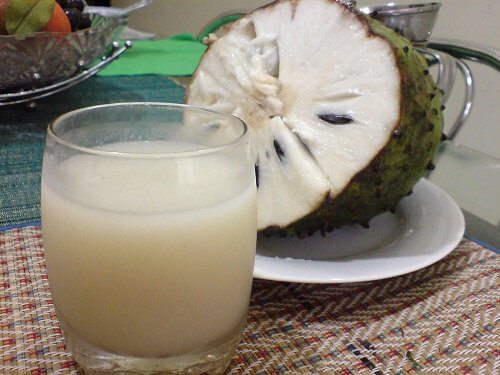8 Little Known Benefits of Soursop


Reviewed and approved by the doctor José Gerardo Rosciano Paganelli
Soursop, or guanabana, is a tropical fruit with a bittersweet flavor. Because of its incredible nutritional properties, it has become one of the most recommended foods for taking care of your health. In this article, we’ll talk about the benefits of soursop.
Historical data shows that it was cultivated in antiquity by many groups indigenous to America. They valued it because of its nutritious and medicinal powers.
In reality, it grows in many other parts of the world. In fact, it’s an indispensable ingredient in many deserts, sweets, smoothies, and many other kinds of recipes.
There’s something many still don’t know about this delicious fruit, however. It has powerful benefits that can improve your quality of life.
Do you want to find out the benefits of soursop? Keep reading!
1. It strengthens your immune system

The high-quality nutrients in soursop are useful for increasing your body’s immune system’s response. That’s one of the main benefits of soursop.
100 grams has up to 20 mg of vitamin C. This is a substance that is essential for increasing the presence of antibodies.
Eating it on a regular basis reduces your susceptibility to infections. It also encourages the elimination of harmful viruses and bacteria.
2. It increases your energy
People with fatigue or difficulties concentrating should pay attention here. You can reduce your symptoms by eating one or two portions of soursop per day.
This delicious food has a significant amount of fructose. This is a natural kind of sugar that “recharges” your body’s energy.
Also, it’s an important source of complex carbohydrates. These are necessary for maintaining mental and physical strength.
3. It may be useful against cancer

It’s shown that this excellent fruit has powerful anti-carcinogenic effects. Its antioxidants cancel out the harmful effects of oxidative damage. In addition, they help attack malignant cells that cause tumors.
In fact, its leaves have been shown to be effective in helping treat various kinds of cancers. These include colon, breast, and lung cancer.
Despite this, it still requires more research. We still need research on how it acts and if it’s effective enough to become a complement to treatment.
4. It protects your nervous system
Soursop has large amounts of B-complex vitamins. Because of this, eating it on a regular basis can have positive effects on your nervous system.
These vitamins improve blood circulation. They’re also a part of a large number of cardiovascular system functions. Also, vitamin B2 regulates your nerves and increases your cognitive functions.
5. Soursop protects your skeletal system

This food has significant benefits for your skeletal system. This one of the reasons that it’s especially recommended to women, children, and the elderly.
Soursop contains phosphorous and calcium. Because of this, adding it to your diet helps to strengthen your bones and your teeth.
It’s a delicious and natural remedy for women during menopause. This is because it helps to prevent bone density loss. This is a condition that women suffer due to the reduction of estrogen levels.
6. It improves your digestive health
Patients with digestive difficulties should pay attention. If you add this fruit to your diet, you’ll find that it’s an excellent ally to reduce your symptoms.
Its high content of fiber and essential nutrients offer a protective effect to your bacterial flora. And, it serves as a way to replenish healthy bacteria.
At the same time, it helps speed up slow bowel movements. It also encourages the elimination of waste and strengthens the digestion of proteins and fats.
7. Soursop helps fight pain

Drinking natural soursop juice has and analgesic and anti-inflammatory effect, which is one of the most significant benefits of soursop.This helps to calm common pains, such as headaches, muscle tension, and cramps.
To successfully fight pain, we recommend you drink soursop juice two or three times per day. This should be complemented with healthy foods and relaxation practices.
8. It prevents hypertension
People who are at risk of suffering from high blood pressure can get benefits, too. These people should eat several portions of soursop each week. One of the main benefits of soursop is that it helps prevent hypertension.
This food helps to reduce water retention. If that’s not enough, it also increases your circulation and elasticity of your arteries.
Now that you know the main benefits of this wonderful tropical fruit, make it a part of your diet. Buy it at your local market or supermarket and enjoy!
All cited sources were thoroughly reviewed by our team to ensure their quality, reliability, currency, and validity. The bibliography of this article was considered reliable and of academic or scientific accuracy.
- Badrie, N., & Schauss, A. G. (2010). “Soursop (Annona muricata L.): Composition, nutritional value, medicinal uses, and toxicology”, In Bioactive Foods in Promoting Health. https://doi.org/10.1016/B978-0-12-374628-3.00039-6
- Arbaisah, S. M., Asbi, B. A., Junainah, A. H., & Jamilah, B. (1997). “Purification and properties of pectinesterase from soursop (Anona muricata) pulp”. Food Chemistry. https://doi.org/10.1016/S0308-8146(96)00043-X
- Arroyo, Jorge, Martínez, Jaime, Ronceros, Gerardo, Palomino, Robert, Villarreal, Aníbal, Bonilla, Pablo, Palomino, Christian, & Quino, Mariano. (2009). Efecto hipoglicemiante coadyuvante del extracto etanólico de hojas de Annona muricata L (guanábana), en pacientes con diabetes tipo 2 bajo tratamiento de glibenclamida. Anales de la Facultad de Medicina, 70(3), 163-167. Recuperado en 16 de enero de 2019, de http://www.scielo.org.pe/scielo.php?script=sci_arttext&;pid=S1025-55832009000300002&lng=es&tlng=es.
- Correa, J., Ortiz, D., Larrahondo, J., Sanchez, M., & Pachon, H. (2012). Actividad antioxidante en guanábana (Annona muricata l.): una revisión bibliográfica. Boletin latinoamericano y del caribe de plantas medicinales y aromáticas, 11(2).
-
Nwokocha CR et al. “Possible mechanisms of action of the hypotensive effect of Annona muricata (soursop) in normotensive Sprague-Dawley rats”, Pharm Biol. 2012 Nov;50(11):1436-41. doi: 10.3109/13880209.2012.684690. Epub 2012 Sep 11.
This text is provided for informational purposes only and does not replace consultation with a professional. If in doubt, consult your specialist.








